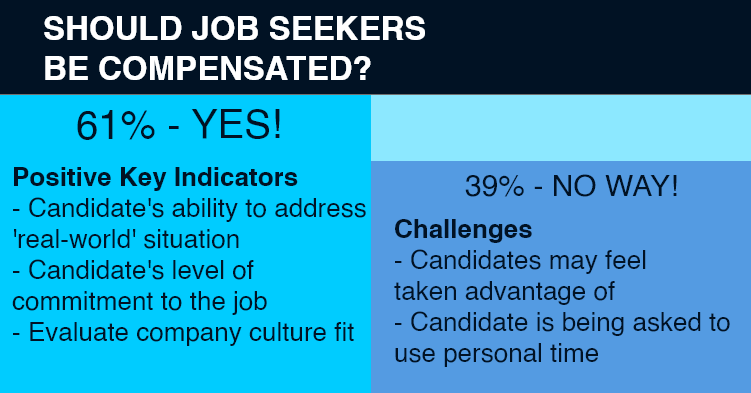So, here’s the thing.
Much of what you’re about to read will likely make you a little uncomfortable, but I promise you if you make it to the end of this article, you’ll realize this is intended to be a “no pain, no gain” type of article, and shares ideas and strategies that I’ve successfully implemented within my own startup, so I’m either crazy or onto something awesome.
Let’s start with some context.
A number of years ago I was working for an HR tech company that was transitioning from the rapid growth phase to the rapid profitability phase. Leadership across all departments was tasked to brainstorm ways their teams could potentially contribute to the company’s bottom line, and HR isn’t exactly known as being a source of revenue, let alone profit, so it was time to venture outside of the box.
Without thinking, and half joking, knowing we received on average about 1,000 job applications per month, I blurted out to my boss and peers, “What if we just started charging job applicants an application fee, just like universities and colleges do?”.
Sure, it was a horrible idea.
No, we didn’t implement the idea.
And sure, when I wrote a blog about the idea lots of people called me a jerk, including some of my colleagues.
I still think the idea has some merit in certain contexts, but now I’m coming full circle and am about to suggest nearly the exact opposite.
Here it goes:
As a startup CxO there are two things you don’t have an excess of.
Time and money.
As a startup CxO there are two things you want immediately.
Scalable results, and massive ROIs as it relates to hiring.
So, should startups charge job seekers a fee for applying to their company?
Definitely not.
Startup CxOs should, however, consider compensating potential hires for their time during the interview process with their company.
Here’s why.
Just like going to Baskin Robbins on a sunny Sunday afternoon, if you enter the hiring process without a clue as to what you’re looking for in a potential hire, or how you’re going to identify that in a stranger through a hundred minutes of video interview time, you’re likely going to end up fascinated with the 31 different flavour options and not actually hire the person you need.
It may not seem obvious, but interviewing people is expensive. — Consider the amount of time you and your team are committing to the process
Consider the true (financial) investment your startup is making when attracting, evaluating, meeting, and ultimately hiring new employees.
As a CxO, it’s easy to view your startup as a breathtaking baby, and view your startup as a “best kept secret” that everyone should want to join, but the reality is your startup is most likely the underdog in the David v Goliath battle for talent within your niche.
Considering the current state of the talent market, the Goliaths out there are set in their ways, and often promote the message of: “you should want to join us, and if you don’t like our terms, then piss off”. Therein lies the advantage for startups.
A human advantage.
The reality is most hiring managers are too busy juggling 13 other priorities when they are hiring, falling victim to the Baskin Robbins syndrome; and only really start to understand what they are actually looking for once they have interviewed 5 or 10 job candidates – that’s a lot of time just to figure out what these people were missing.
By having a plan on how you’re going to objectively evaluate talent against your business needs, you can easily cut down the volume of people that you allow into your interview process, and make the whole hiring cycle better, faster, and more efficient for all. — insider tip: our eBook has tips and best practices on how to prep, organize and evaluate your interviews with helpful tools
The solution here is simple.
Consistently hiring well does not happen by chance. To make the most of your hiring, it’s of vital importance for your startup to have a clear understanding of:
What tangible outcomes (X) will my successful hire be expected to deliver within what (Y) timeframe and with what (Z) resources?
If you or your hiring managers do not have a clear understanding of the answer to the above question, it’s very likely that you and your team may not be evaluating candidates as effectively as you could be, and putting your business and your team at risk of missing your objectives.
Yes, this is a challenge that we see every day with our startup clients at Pivot + Edge, and yes, we have a solution that is simple and easy to implement.
It’s called job score carding. — We won’t get into all the details on that here but if you want to learn more head over to our resource page for more information
Now you may be wondering how I would implement this idea of compensating potential candidates for their time if I wanted to try this out with my startup.
Simple.
It starts at the beginning.
Yes, you need to have an appealing mission/vision that captures your ideal hire’s attention.
Yes, you need to have a concise and detailed job posting that speaks to your ideal hire.
Yes, you need to have access to candidates to interview in the first place…
But, the rest is all math.
As a gross generalization, it’s very normal to see a 100:10:1 ratio in hiring.
100 applicants per role, 10 of which are worth a phone screen, 1 of which is hireable.
As a startup CxO, to shift the math to your advantage, there are a handful of things you can easily implement to help sift through candidates at an early stage.
Maybe that means including a Yes/No question that all job candidates must answer as they submit their application to you such as “Are you legally entitled to work in __________ without requiring sponsorship at present?”. If you’re not prepared or able to sponsor new hires, this question alone is going to likely eliminate half of the resumes you’ll collect, and save you plenty of wasted interview hours.
Maybe that means providing folks that pass your initial conversation with a job specific functional assessment that provides you with insight on how your potential hire would actively approach a real-life project should they join your team. I’m a huge fan of implementing this step.

I recently released a LinkedIn poll to get an idea of where others landed on the topic and it sparked some interesting comments and thought starters. With 61% of the voters (out of 321 votes) agreeing that job seekers should be compensated for participating in the interview process.
There are those out there that will say the number one predictor of future success in hiring is past career success, but I think that argument lacks merit, and here’s why:
If I were to ask who would win in a fight between a Grizzly Bear and a Great White Shark, having the environmental context would quickly shift your answer.
By creating a job-specific, functional assessment that provides job candidates with an opportunity to showcase how they would address a real-life challenge within your startup’s context, you get to see how they would implement all of the learnings they have collected from their previous experience, and you get to see how they would execute those learnings into deliverables.
Now, I’ve gotten a little off track and should tie this all back to the main point of this article.
Should I compensate each and every single job candidate that I interview?
No.
Does that mean I should compensate each and every person that I ask to go above and beyond and complete our job specific functional assessment?
Yes.
I’ll bet I can guess your next question:
“If I were to compensate every person that completes a job specific functional assessment, how much should I pay them?”
And it is a great question. I feel the best answer to that question is to consider the likely (hourly) compensation you’d be paying your next hire, multiplied by the number of hours you expect an ideal hire to require to complete the job specific assessment you provide them.
Let that sink in.
That could mean investing $100 – $250 of actual dollars in people that don’t yet work for your organization that will ultimately join your startup and help you hit your hockey stick moment.
That could also mean investing $1,000 – $2,000 of actual dollars into people that you will not hire.
That’s a whopping total of $1,100 – $2,250 of additional spend, but what did you get for that investment?
A whole lot of additional data points that will help you make the decisions that ultimately lead to scalable hiring results and massive ROIs as it relates to hiring.
The other obvious option to consider is farming this out to a company like Pivot + Edge. (it wouldn’t be a blog post if we didn’t give you that option!)
– bigtalljohn







